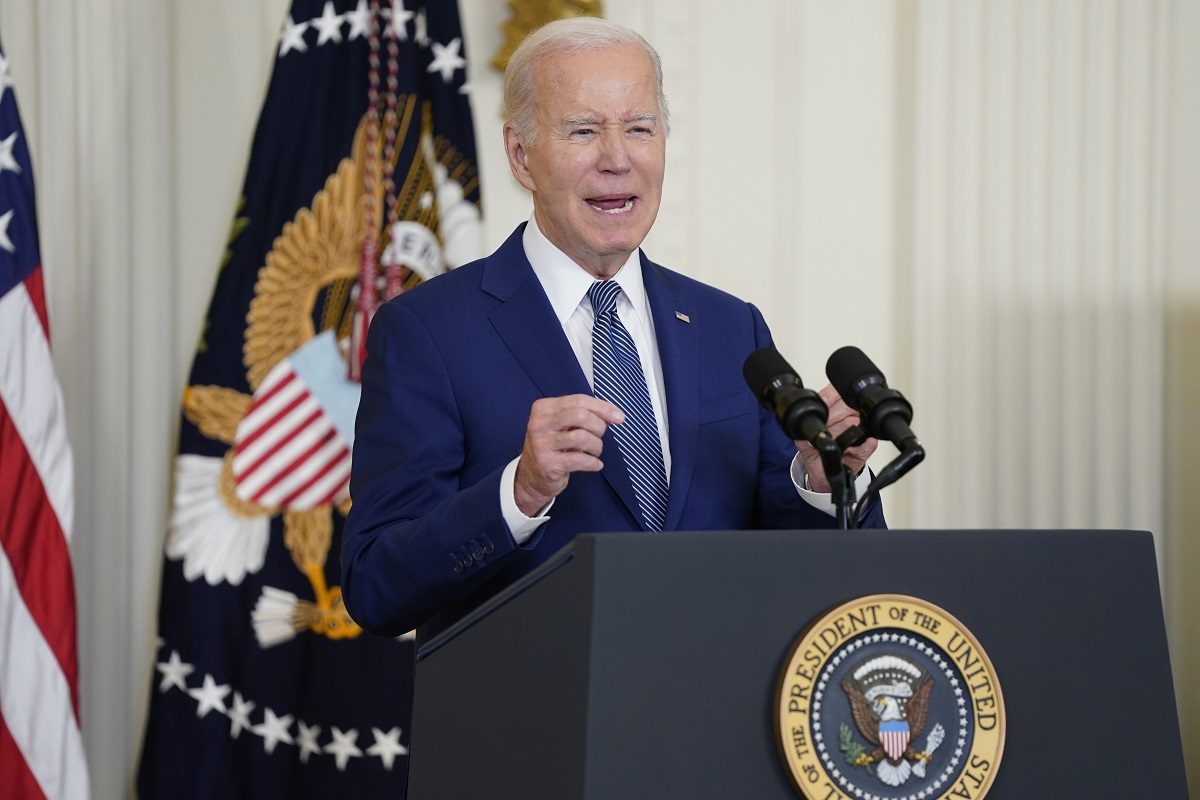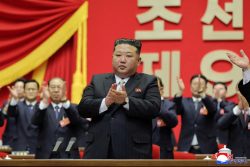Biden Calls Mutiny a ‘Struggle within the Russian System’ and Says US and NATO Played No Part

President Joe Biden speaks during an event about high speed internet infrastructure, in the East Room of the White House, Monday, June 26, 2023, in Washington.
11:49 JST, June 27, 2023
WASHINGTON (AP) — President Joe Biden declared Monday that the United States and NATO played no part in the Wagner mercenary group’s short-lived insurrection in Russia, calling the uprising and the longer-term challenges it poses for President Vladimir Putin’s authority “a struggle within the Russian system.”
Biden and U.S. allies supporting Ukraine in its fight against Russia’s invasion emphasized their intent to be seen as staying out of the mercenaries’ stunning insurgency, the biggest threat to Putin in his two decades leading Russia. They are concerned that Putin could use accusations of Western involvement to rally Russians to his defense.
Biden and administration officials declined an immediate assessment of what the 22-hour uprising by the Wagner Group might mean for Russia’s war in Ukraine, for mercenary chief Yevgeny Prigozhin or for Russia itself.
“We’re going to keep assessing the fallout of this weekend’s events and the implications from Russia and Ukraine,” Biden said. “But it’s still too early to reach a definitive conclusion about where this is going.”
Putin, in his first public comments since the rebellion, said “Russia’s enemies” had hoped the mutiny would succeed in dividing and weakening Russia, “but they miscalculated.” He identified the enemies as “the neo-Nazis in Kyiv, their Western patrons and other national traitors.”
And Foreign Minister Sergey Lavrov said the special services were already investigating whether Western intelligence services were involved in Prigozhin’s rebellion.
Over the course of a tumultuous weekend in Russia, U.S. diplomats were in contact with their counterparts in Moscow to underscore that the American government regarded the matter as a domestic affair for Russia, with the U.S. only a bystander, State Department spokesman Matthew Miller said.
American diplomats also stressed to Moscow that they expected Russia to ensure the safety of the U.S. Embassy in Moscow and Americans detained in Russia, Miller said.
In a video call between Biden and leaders of U.S.-allied countries over the weekend, all were determined to give Putin “no excuse to blame this on the West,” Biden told reporters at the White House.
“We made clear that we were not involved. We had nothing to do with it,” Biden said. “This was part of a struggle within the Russian system.”
Michael McFaul, a former U.S. ambassador to Russia, said Putin in the past has alleged clandestine U.S. involvement in events — including democratic uprisings in former Soviet countries, and campaigns by democracy activists inside and outside Russia — as a way to diminish public support among Russians for those challenges to the Russian system.
The U.S. and NATO “don’t want to be blamed for the appearance of trying to destabilize Putin,” McFaul said.
A feud between Prigozhin and Russia’s military brass that has festered throughout the war erupted into the mutiny that saw the mercenaries leave Ukraine to seize a military headquarters in a southern Russian city. They rolled for hundreds of kilometers toward Moscow, before turning around on Saturday, in a deal whose terms remain uncertain.
Biden’s national security team briefed him hourly as Prigozhin’s forces were on the move, the president said. He had directed them to “prepare for a range of scenarios” as Russia’s crisis unfolded, he said.
Biden did not elaborate on the scenarios. But national security spokesman John Kirby addressed one concern raised frequently by the public, news media and others as the world watched the cracks opening in Putin’s hold on power — worries that the Russian leader might take extreme action to reassert his command.
Putin and the Kremlin have made repeated references to Russia’s nuclear weapons since invading Ukraine 16 months ago, aiming to discourage NATO countries from ratcheting up their support to Ukraine.
“One thing that we have always talked about, unabashedly so, is that it’s in nobody’s interest for this war to escalate beyond the level of violence that is already visited upon the Ukrainian people,” Kirby said at a White House news briefing. “It’s not good for, certainly, Ukraine and not good for our allies and partners in Europe. Quite frankly, it’s not good for the Russian people.”
In the aftermath of the mutiny, both Prigozhin and Russian Defense Minister Sergei Shoigu made public comments Monday aiming to play down the crisis.
In an 11-minute audio statement, Prigozhin said he acted “to prevent the destruction of the Wagner private military company” and in particular in response to an attack on a Wagner camp that killed some 30 of his fighters.
Biden spoke with Ukrainian President Volodymyr Zelenskyy over the weekend, telling him, “‘No matter what happened in Russia, let me say again, no matter what happened in Russia, we in the United States would continue to support Ukraine’s defense and sovereignty and its territorial integrity.” Biden said. He said he intended to speak with Zelenskyy again late Monday or early Tuesday.
The Pentagon is expected to announce Tuesday that it is sending up to $500 million in additional military aid to Ukraine, including more than 50 heavily armored vehicles and an infusion of missiles for air defense systems, U.S. officials said Monday. They spoke on condition of anonymity because the aid has not yet been publicly announced.
Biden, in the first weeks after Putin sent tens of thousands of Russian forces into Ukraine in February 2022, had issued a passionate statement against the Russian leader’s continuing in command. “For God’s sake, this man cannot remain in power,” he said then, as reports emerged of Russian atrocities against civilians in Ukraine.
On Monday, U.S. officials were careful not to be seen as backing either Putin or his former longtime protege, Prigozhin, in public comments.
“We believe it’s up to the Russian people to determine who their leadership is,” Kirby said.
White House officials were also trying to understand how Beijing was digesting the Wagner revolt and what it might mean for the China-Russia relationship going forward. China and Russia are each other’s closest major partner. The White House says Beijing has considered — but not followed through on — sending Russia weaponry for use in Ukraine.
“I think it’d be fair to say that recent developments in Russia had been unsettling to the Chinese leadership,” said Kurt Campbell, coordinator for the Indo-Pacific at the White House National Security Council, speaking at a forum hosted by the Center for Strategic and International Studies in Washington. “I think I’ll just leave it at that.”
China values Russia as a friend in part to keep from standing alone against the U.S. and its allies in disputes. With Russia’s invasion and resulting international sanctions sapping Russian resources and now sparking a rebellion, McFaul said, Ukraine and its allies could make the case: “‘Xi Jinping, you know, if you want your buddy to stay in power, maybe this is the time to put some pressure on him to wrap up this war.”’
Top Articles in News Services
-

Survey Shows False Election Info Perceived as True
-

Prudential Life Expected to Face Inspection over Fraud
-

Hong Kong Ex-Publisher Jimmy Lai’s Sentence Raises International Outcry as China Defends It
-

Japan’s Nikkei Stock Average Touches 58,000 as Yen, Jgbs Rally on Election Fallout (UPDATE 1)
-

Japan’s Nikkei Stock Average Falls as US-Iran Tensions Unsettle Investors (UPDATE 1)
JN ACCESS RANKING
-

Japan PM Takaichi’s Cabinet Resigns en Masse
-

Japan Institute to Use Domestic Commercial Optical Lattice Clock to Set Japan Standard Time
-

Israeli Ambassador to Japan Speaks about Japan’s Role in the Reconstruction of Gaza
-

Man Infected with Measles Reportedly Dined at Restaurant in Tokyo Station
-

Videos Plagiarized, Reposted with False Subtitles Claiming ‘Ryukyu Belongs to China’; Anti-China False Information Also Posted in Japan























